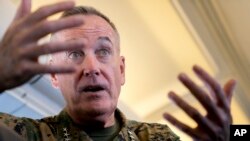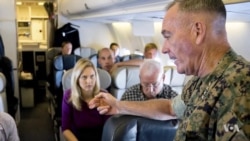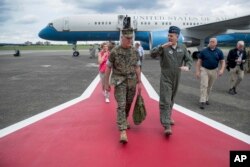The top U.S. general is on the Korean Peninsula as annual U.S. and South Korean military exercises risk further increasing tensions with North Korea.
U.S .Chairman of the Joint Chiefs of Staff Joe Dunford said his visit to the region this week is aimed at reassuring allies South Korea and Japan, while building the military-to-military relationship with China in order to prevent miscalculations.
WATCH: Top US General Arrives on Korean Peninsula for Talks on North Korea Threat
He met with South Korean President Moon Jae-In and South Korean Defense Minister Song Young-moo on Monday in Seoul, and travels to China Monday and Japan later in the week.
Defense Secretary Jim Mattis and Secretary of State Rex Tillerson reiterated in a Wall Street Journal opinion article posted late Sunday that the U.S. goal is the peaceful denuclearization of the Korean Peninsula, and that it is up to North Korea to show its willingness to engage in good-faith negotiations.
"North Korea now faces a choice.Take a new path toward peace, prosperity and international acceptance, or continue further down the dead alley of belligerence, poverty and isolation," Mattis and Tillerson said.They also highlighted a need for China to use its "decisive diplomatic and economic leverage over North Korea."
Meanwhile, senior U.S. national security officials said Sunday a military confrontation with North Korea is not imminent, but the possibility of war has increased.
CIA Director Mike Pompeo said on Fox News Sunday North Korea's push to develop a nuclear-tipped ballistic missile capable of hitting the United States, "... is a very serious threat and the administration is going to treat it as such."
President Donald Trump's national security adviser, H.R. McMaster, on ABC's This Week program said "...We are not closer to war than a week ago, but we are closer to war than we were a decade ago.''
Dunford said the military’s “primary focus” is supporting the administration’s diplomatic and economic campaign to denuclearize the Korean peninsula, while preparing military options in the event that campaign fails.
“We’re all looking to get out of this situation without a war,” Dunford said, even as he stressed Pyongyang possessing nuclear weapons that threaten the United States and its regional allies is “unacceptable.”
“As a military leader, I’ve got to make sure that the president does have viable military options in the event that the diplomatic and economic pressurization campaign fails,” he added.
But some experts do not agree that Pyongyang’s acquisition of nuclear weapons is an unacceptable option. Richard Bush, a senior fellow in the Brookings Institution’s John L. Thornton China Center, said the Trump administration has “made a big mistake” by determining that North Korea’s possession of nuclear weapons capable of hitting the United States is something to fight over.
“The bigger danger or focus should be ensuring that North Korea doesn’t use those capabilities,” Bush told VOA.
Dunford arrived at Osan Air Base plans to meet South Korean President Moon Jae-In and his South Korean military counterpart on Monday before traveling to China and Japan later in the week.
New military exercises to start
Annual exercises between the U.S. and South Korean militaries, dubbed Ulchi-Freedom Guardian, begin later this month. North Korea has always condemned these exercises, and some experts fear these war games could increase hostilities from Pyongyang while irking Beijing, a key influencer of North Korea.
“If you have the current tensions and pile on top of that these exercises, it’s going to make for a much worse situation,” Joel Wit, who helped negotiate the 1994 U.S.-North Korea nuclear deal that delayed North Korea’s nuclear program for almost a decade, told VOA.
A senior official with U.S. Pacific Command, which overseas military activity in the region, said China will almost certainly propose to Dunford that the U.S. and South Korea stop these exercises. However, the Trump administration would not agree to that proposal because it considers the exercises necessary for readiness in the event of an attack, the official added.
In the past, China has been reluctant to deny resources to North Korea in order to pressure Pyongyang to curb its nuclear weapons ambitions. But in the last few weeks, China has appeared to take measures to keep its bad-behaving neighbor in check.
Last week China voted alongside a unanimous U.N. Security Council to impose strict new sanctions on Pyongyang in response to North Korea's launch of two intercontinental ballistic missiles last month. Estimates say the new sanctions could cost Pyongyang $1 billion a year.
And on Friday, China’s Global Times Newspaper warned that China will not come to North Korea’s aid if it launches missiles threatening American soil and would only intervene if the United States strikes North Korea first.
Bruce Bennett, a defense analyst at RAND Corporation, noted that Chinese President Xi Jinping has held eight summit meetings with the South Korean president but none with the young North Korean leader, which he said “clearly suggests” that Xi “thinks Kim Jong Un is a lightweight and really not important.”
‘Locked and loaded’
The chairman’s visit comes just two days after U.S. President Donald Trump warned in a tweet that military solutions were “locked and loaded” should North Korea act unwisely. “Hopefully Kim Jong Un will find another path," Trump tweeted.
North Korean state media announced the country is drawing up plans to fire missiles near the U.S. Pacific territory of Guam, as the U.S. military continued preparations for a potential military response.
The United States has carried our several B-1B Lancer strategic bomber jet flights from Guam to the peninsula, with the last one carried out about a week ago. Japanese and South Korean jets have escorted the bombers at times.
The United States also has deployed Terminal High Altitude Area Defense (THAAD) anti-ballistic missile system to South Korea that can shoot down short, medium and intermediate-range ballistic missiles. Two of the system’s six launchers are fully operational, and President Moon has ordered consultations on the possibility of deploying the final four interceptors, which are already in-country. THAAD’s ability to take out missile threats has proven 15 for 15 in tests conducted since 2005, when the system began operational testing.
THAAD is also deployed on Guam, along with Aegis ships that have Standard Missile 3 (SM-3) interceptors used to destroy medium and intermediate-range ballistic missiles.
The U.S. mainland is defended from intercontinental ballistic missiles by ground-based interceptors located at Fort Greely, Alaska.







